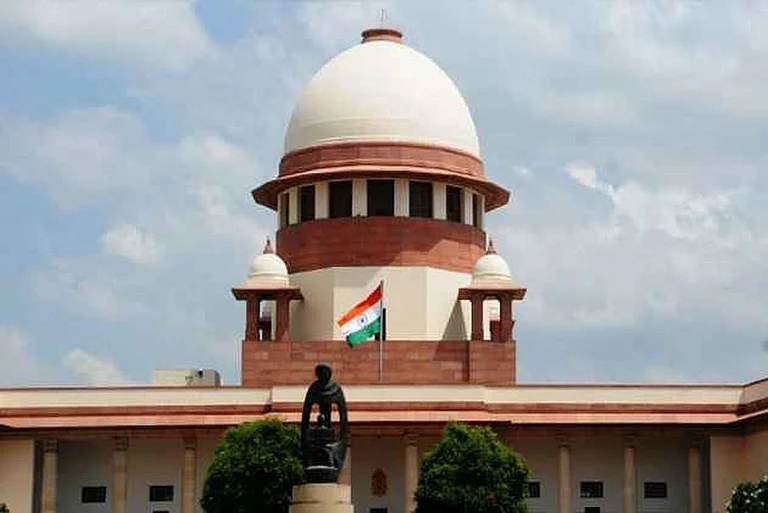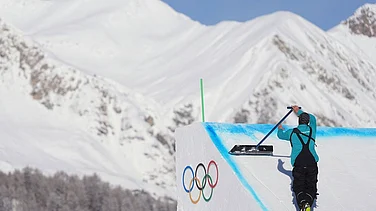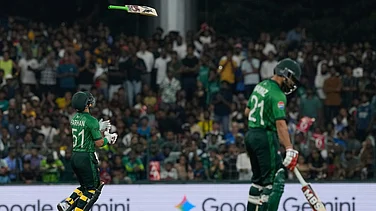Having made history by winning India’s first ever gold medal in an individual event at the 2008 Beijing Olympic Games, ace rifle shooter Abhinav Bindra is aiming for an encore in Rio. A focused Bindra, who won gold in the 10-metre air rifle event, has been training hard. He is quietly confident of signing off on a high note after his fifth straight, and last, Olympic Games.
“I am going without any pressure to do the best for India in my last Olympic Games,” a suave Bindra tells Outlook. “Experience counts, but past is past, not to be counted how I perform now. Let us see [on] the day!”
Abhinav, 33, has been competing and training mostly abroad, often in Germany under Gabriele ‘Gaby’ Buhlmann, a Swiss rifle-shooter and a veteran of five successive Olympics, starting 1988. Gabriele played a crucial part in Bindra’s Beijing gold, acknowledges the ace shooter. “She was a most dedicated coach and played a significant role, giving her 100 per cent,” he says.
Ahead of the 2008 Olympics, too, Abhinav’s preparation was intense. Apart from regular training, the groundwork included a commando course and climbing an 80-foot pole “to get fear out of my mind”, he recalls.
But before he attained that golden peak in China, and after that, the Olympics had not been a happy hunting ground for Abhinav.
In the 2000 Sydney Olympics, Abhinav missed qualifying for the finals by a solitary point and finished 11th (he admits having a “torrid time”). In 2004 in Athens, despite having qualified for the finals in the third position, he finished a disappointing seventh. The peak, of course, came in 2008; four years later, Abhinav finished 16th in London, where Gagan Narang clinched the bronze in the very same 10m air rifle event. Gagan will again compete against Abhinav in Rio.
How does Abhinav keep himself motivated? “It is self-motivation, desire to excel and excel and excel,” he asserts. Which sporting legends motivate him? “Legends can’t motivate,” he says. “You only see their wins to get a desire to emulate their feats, but ultimately it is your own self, as shooting is an individual sport.”
Abhinav is fortunate in that his family is a well-heeled one. He has always received the full backing of his family in his endeavour that has consumed almost all of his adult life. Competitive shooting is an expensive sport, after all, and only the rare Indian can afford to instal a shooting range at home, or stay abroad for prolonged spells of training.
Abhinav shares his efforts towards the gold finish under coach Gabriele. “It was my focus on training, vision and will to win an Olympic gold for India. It was my challenge to achieve it. I did it—an individual gold after 106 years of participation,” he says, referring to India’s history at the Olympics. India first sent an athlete to the Games in 1900, Paris.
Listing the main factors that contributed to his finest hour, Abhinav points out: “My determination and self-belief to win and the do-or-die spirit.” Ask him about the sacrifices he made. Abhinav’s answer is poignant: “My entire youth.”

Federer
Retired Hurt
Tennis great Roger Federer, 34, will not be seen in Rio. The 17-time Grand Slam champion will miss the Olympics and the rest of the season with a knee injury. He had knee surgery in February and missed the French Open with a back problem in May. Federer won the Olympics doubles gold in 2008 but never the singles crown. In the 2012 London Olympics singles final, he lost to Andy Murray.

Russia
No Total Ban
There will be no blanket ban on Russia athletes for widespread doping. The IOC has decided that cases of individual athletes would be treated on the recommendations of international federations of sports “...according to the rules of natural justice....”

Narsingh, Inderjeet
Test Positive
Wrestler Narsingh Yadav and shot-putter Inderjeet Singh have tested positive for banned drugs and their Olympic participation is under threat. While Narsingh tested positive for the anabolic steroid methandienone, Inderjeet is said to have tested positive for androsterone and etiocholanolone. Narsingh, 26, who had qualified in the 74 kg category, has alleged that his food/supplements were spiked by rivals when he trained in Sonepat. He has since lodged an FIR with the police, accusing a cadet wrestler of spiking his food even as the National Anti-Doping Agency heard his claim. The wrestling federation has named Parveen Rana as a substitute wrestler. After Narsingh had got a berth for the Olympics, he fought and won a court battle with Sushil Kumar over the spot. A 2014 Asian Games bronze medallist, Inderjeet, too, claimed he was clean and alleged a conspiracy against him. NADA says the shot-putter disappeared for a period, making them suspicious. When he got back and was tested, he returned a positive result.

High Count
Railways’ Hour Of Glory
The Railways Sports Promotion Board (RSPB) has set an Olympic-related record that it can be proud of. Out of the 120 Indians who have made it to the Rio Games, as many as 34 athletes (including women’s hockey captain Sushila Chanu, in pic) belong to the RSPB. So, what is the reason for this burst in numbers? “There are several factors...now there are more preparatory camps. Earlier, there used to be a solitary, annual camp for our teams competing in nationals. Now, a minimum of four camps are organised. We do talent-scouting at junior nationals, with athletes like P.T. Usha and former shot-putter Bahadur Singh being among the scouts,” RSPB secretary Rekha Yadav tells Outlook. Rekha says another addition is the launch of a scheme that provided “year-round leave-and-training” for athletes. “Then there are cash incentives for our athletes,” she emphasises. At the 2014 Asian Games, Railway athletes who won gold, silver and bronze received Rs 25 lakh, Rs 20 lakh and Rs 15 lakh respectively.

Sao Paolo’s Marcelo Anderson, who won the Olympics-themed ‘Brazilian Barber Battle’, in action
108 After 108 years, Ireland’s men’s hockey team, comprising mainly amateurs and part-funded by devoted fans, has qualified for the Olympics.


























